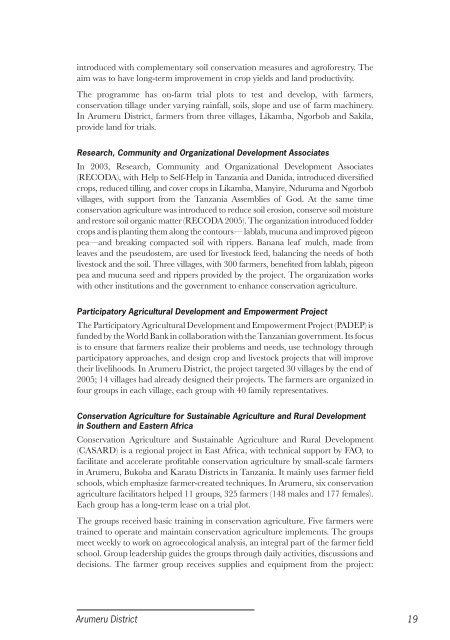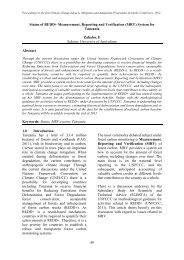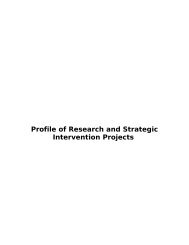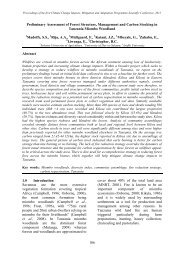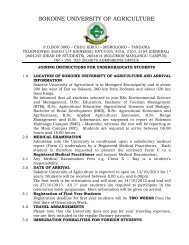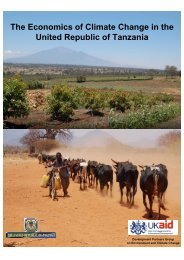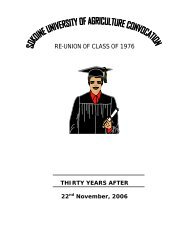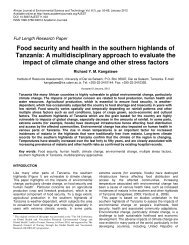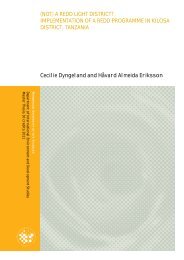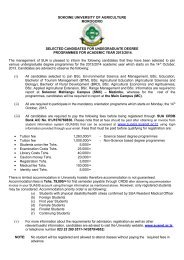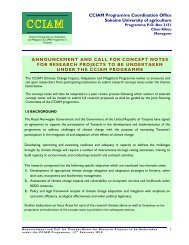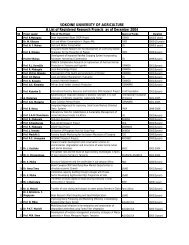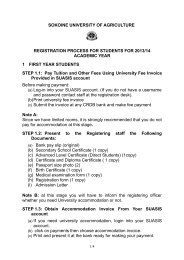4 <strong>Conservation</strong> <strong>agriculture</strong> historyInstitutionsSee appendix 1 for a complete list of conservation <strong>agriculture</strong> institutes andprojects.Selian Agricultural Research InstituteThe Selian Agricultural Research Institute (SARI) is the biggest agriculturalresearch institute pioneering conservation <strong>agriculture</strong>. Its objective is to attainsustainable household and community food security. It focuses on crops, soils andlivestock. SARI has several on-farm trials in Arumeru District, including integratedsoil fertility management, zero-grazing and agroforestry. It conducts station trials,which many farmers visit during field days. Some of the demonstration plots includesubsoiling, cover crops, intercropping pigeon pea, and crop rotation. The institute isalso a resource centre for agricultural information.SARI has been involved with conservation <strong>agriculture</strong> since 1999, developing notilling,intercropping, and soil cover. Similarly, SARI has been able to distribute covercrop seeds to the district council, farmers and conservation <strong>agriculture</strong> projects and isaccelerating the use of cover crops. SARI collaborates strongly with other organizations.SARI has given lablab seeds to 586 farmers in Arumeru (see appendix 3.)Heifer Project InternationalHeifer Project International has a long history in Arumeru District. It mainlypromotes improved dairy cattle under zero-grazing. The project emphasizesestablishing pasture before a farmer can receive a heifer and support from HeiferProject International. Pastures are established in plots and along contour bundsfor fodder and stabilizing the bunds. Heifer Project has a strong influence on soiland water conservation, since a farmer has to establish fodder grown on contourbunds.Soil <strong>Conservation</strong> and Agroforestry Programme in ArushaThe Soil <strong>Conservation</strong> and Agroforestry Programme in Arusha (SCAPA) is acommunity land-management programme, operating since 1989. In 1989, itobserved that in various agroecological zones, crops and fodder had stunted growth,low productivity and sensitivity to even short dry spells. The roots of pigeon pea,shrubs and fodder crops revealed serious restriction from hardpan 10–12 cm belowthe surface (Mwalley and Mawenya 2002). The hardpan was caused by mechanizedhoeing and ploughing.SCAPA entered into partnership with RELMA and started introducing, testingand designing conservation tillage with farmers in 1998. Contour constructionwas undertaken by the new partnership. Later, it was apparent poor infiltration ofrainwater into the soil led to high runoff between the fanya chini terraces (Mwalleyand Mawenya 2002). Reduced tillage techniques, rippers and subsoilers, were18 Maguzu et al.
introduced with complementary soil conservation measures and agroforestry. Theaim was to have long-term improvement in crop yields and land productivity.The programme has on-farm trial plots to test and develop, with farmers,conservation tillage under varying rainfall, soils, slope and use of farm machinery.In Arumeru District, farmers from three villages, Likamba, Ngorbob and Sakila,provide land for trials.Research, Community and Organizational Development AssociatesIn 2003, Research, Community and Organizational Development Associates(RECODA), with Help to Self-Help in <strong>Tanzania</strong> and Danida, introduced diversifiedcrops, reduced tilling, and cover crops in Likamba, Manyire, Nduruma and Ngorbobvillages, with support from the <strong>Tanzania</strong> Assemblies of God. At the same timeconservation <strong>agriculture</strong> was introduced to reduce soil erosion, conserve soil moistureand restore soil organic matter (RECODA 2005). The organization introduced foddercrops and is planting them along the contours— lablab, mucuna and improved pigeonpea—and breaking compacted soil with rippers. Banana leaf mulch, made fromleaves and the pseudostem, are used for livestock feed, balancing the needs of bothlivestock and the soil. Three villages, with 300 farmers, benefited from lablab, pigeonpea and mucuna seed and rippers provided by the project. The organization workswith other institutions and the government to enhance conservation <strong>agriculture</strong>.Participatory Agricultural Development and Empowerment ProjectThe Participatory Agricultural Development and Empowerment Project (PADEP) isfunded by the World Bank in collaboration with the <strong>Tanzania</strong>n government. Its focusis to ensure that farmers realize their problems and needs, use technology throughparticipatory approaches, and design crop and livestock projects that will improvetheir livelihoods. In Arumeru District, the project targeted 30 villages by the end of2005; 14 villages had already designed their projects. The farmers are organized infour groups in each village, each group with 40 family representatives.<strong>Conservation</strong> Agriculture for Sustainable Agriculture and Rural Developmentin Southern and Eastern Africa<strong>Conservation</strong> Agriculture and Sustainable Agriculture and Rural Development(CASARD) is a regional project in East Africa, with technical support by FAO, tofacilitate and accelerate profitable conservation <strong>agriculture</strong> by small-scale farmersin Arumeru, Bukoba and Karatu Districts in <strong>Tanzania</strong>. It mainly uses farmer fieldschools, which emphasize farmer-created techniques. In Arumeru, six conservation<strong>agriculture</strong> facilitators helped 11 groups, 325 farmers (148 males and 177 females).Each group has a long-term lease on a trial plot.The groups received basic training in conservation <strong>agriculture</strong>. Five farmers weretrained to operate and maintain conservation <strong>agriculture</strong> implements. The groupsmeet weekly to work on agroecological analysis, an integral part of the farmer fieldschool. Group leadership guides the groups through daily activities, discussions anddecisions. The farmer group receives supplies and equipment from the project:Arumeru District 19
- Page 6: ContentsPreface ...................
- Page 10: Full conservation agriculture, howe
- Page 13 and 14: February 2005, which made possible
- Page 16 and 17: Table B. Key characteristics of cas
- Page 18: Overemphasis on field-scale, techni
- Page 26 and 27: Arumeru DistrictCatherine W. Maguzu
- Page 28 and 29: 8 Gaps and challenges .............
- Page 30 and 31: Executive summaryA case study of co
- Page 32 and 33: It has shown increase in yields, re
- Page 34 and 35: The case study teamThe local team w
- Page 36 and 37: NgorongoroKageraMaraMonduliArumeruM
- Page 38 and 39: MarketsThe urban centres are Kikati
- Page 40 and 41: middle-aged, who migrate to towns t
- Page 44 and 45: maize, pigeon pea, and lablab seeds
- Page 46 and 47: herbicide was completely abandoned
- Page 48 and 49: Most of the implements, except the
- Page 50 and 51: 6 Adapting and diffusing conservati
- Page 52 and 53: villages with eight farmers (Mwalle
- Page 54 and 55: ecognition and enforcement of the b
- Page 56 and 57: Table 3. Labour for conservation ag
- Page 58 and 59: Timeliness in irrigating a farm is
- Page 60 and 61: to rehabilitate his land by constru
- Page 62 and 63: Land tenureSmall-scale farmers will
- Page 64 and 65: and handling herbicides should be d
- Page 66 and 67: Appendix 1Conservation agriculture
- Page 68 and 69: Organization Activities Methods to
- Page 70 and 71: Appendix 3Lablab and mucuna seed di
- Page 73: Karatu DistrictDominick E. Ringo, C
- Page 76 and 77: 10 Benefi ts and effects of conserv
- Page 78 and 79: Karatu acknowledgementsWe are very
- Page 80 and 81: Forces driving for adoption of cons
- Page 82 and 83: Despite the soundness of conservati
- Page 84 and 85: NgorongoroKageraMaraMonduliArumeruM
- Page 86 and 87: TemperatureTemperature decreases wi
- Page 88 and 89: Most of the surface and underground
- Page 90 and 91: crop does not store well. But when
- Page 92 and 93:
used to attend to AIDS sufferers an
- Page 94 and 95:
Erosion is now considered responsib
- Page 96 and 97:
Traditional methods of soil conserv
- Page 98 and 99:
Tanzania Association of ForestersAc
- Page 100 and 101:
Tanganyika Farmers AssociationAchie
- Page 102 and 103:
History of conservation agriculture
- Page 104 and 105:
what is feasible is to intercrop, w
- Page 106 and 107:
to connect experiences from differe
- Page 108 and 109:
mainly cover crop practices were ad
- Page 110 and 111:
Alfred’s neighbour Cornel has bee
- Page 112 and 113:
study tours, organizing farmer fiel
- Page 114 and 115:
Socio-economic and process aspectsW
- Page 116 and 117:
abreast of information. Information
- Page 118 and 119:
availability of agriculture credit,
- Page 120 and 121:
package being introduced should con
- Page 122 and 123:
of a planning workshop on conservat
- Page 124 and 125:
Organiza tionRIDEP (1980-1984)Natio
- Page 126 and 127:
Organiza tionMazingira BoraKaratu (
- Page 128 and 129:
Appendix 3 Estates in Karatu Distri
- Page 131 and 132:
ContentsAbbreviations .............
- Page 133 and 134:
AbbreviationsARIAgricultural Resear
- Page 135 and 136:
1 IntroductionOver 80% of the peopl
- Page 137 and 138:
3 MethodMbeya was selected as a cas
- Page 139 and 140:
Table 1. Agricultural characteristi
- Page 141 and 142:
Three agricultural officers serve t
- Page 143 and 144:
egin until the first rains. Maize y
- Page 145 and 146:
Table 4. Conservation agriculture r
- Page 147 and 148:
slasher, machete and billhook (nyen
- Page 149 and 150:
Farmers were advised to slash the c
- Page 151 and 152:
technical support. Trial treatments
- Page 153 and 154:
In the latest FARM Africa project,
- Page 155 and 156:
Crop yieldsNineteen farmers in Wang
- Page 157 and 158:
Changes in costs and incomeThe aver
- Page 159 and 160:
• Farmers proposed that to improv
- Page 161 and 162:
10 Gaps and challengesDespite the s
- Page 163 and 164:
12 Recommendations• While some be
- Page 165 and 166:
Appendix 1 Selected farmer profiles
- Page 167 and 168:
No. Farmer name M/F Age(yrs)Fam ily
- Page 169 and 170:
Appendix 3Intervention detailsIniti
- Page 171 and 172:
Conservation agriculture technology
- Page 173 and 174:
Land degradation due to soil erosio
- Page 175 and 176:
Banana crop with mucuna as a cover
- Page 177 and 178:
Types of soil cover: lablab plus ma
- Page 179 and 180:
The pigeon pea crop has been left o
- Page 181 and 182:
Demonstrating conservation agricult
- Page 183:
Transferring crop residue for lives


